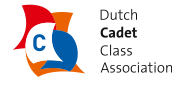
Binnenkort nieuwe website
Dutch Cadet Class Association
(DCCA)
Pannekoeklaan 8
6866 BT Heelsum
Locatie Watersportvereniging Giesbeek
Secretariaat DCCA
secretaris@cadet.nl

Dutch Cadet Class Association
(DCCA)
Pannekoeklaan 8
6866 BT Heelsum
Locatie Watersportvereniging Giesbeek
Secretariaat DCCA
secretaris@cadet.nl